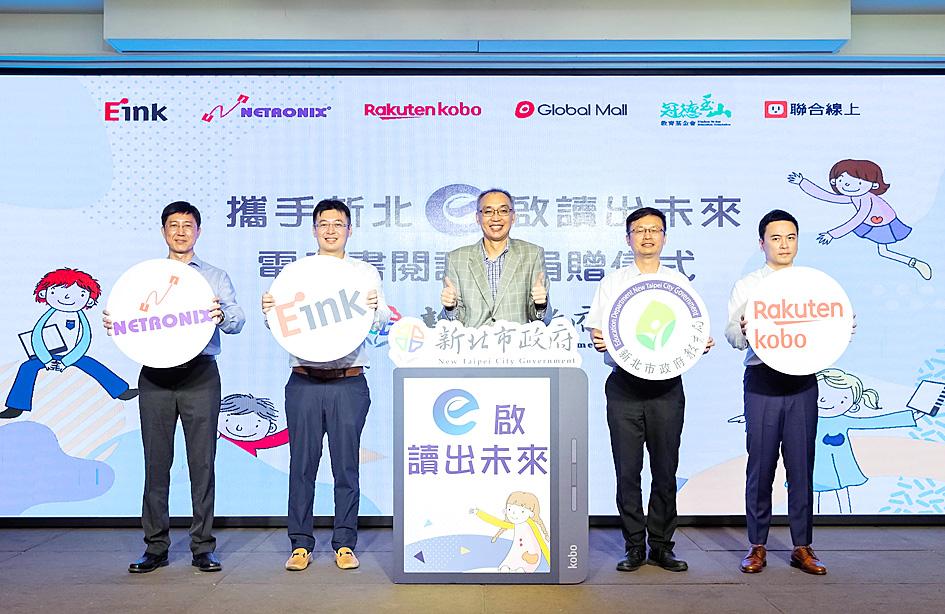E Ink Holdings Inc (元太科技), the world’s sole supplier of e-paper displays, expects revenue to climb to a four-year high this year as the COVID-19 pandemic helps fuel demand for e-readers and electronic shelf labels during the year-end shopping season.
The Hsinchu-based company said that retailers are accelerating adoption of electronic shelf labels to avoid virus transmission routes as well as to enhance delivery efficiency, as COVID-19 infections remain severe in the US and Europe.
Consumers are buying e-readers, tablet computers and laptops for remote learning or entertainment, instead of other items, as they are confined at home amid the pandemic, E Ink said.

Photo courtesy of E Ink Holdings Inc
The company is to introduce its new colored e-paper displays used in e-readers in the final quarter of this year.
Demand for its new color e-paper displays, dubbed Kaleido, has also improved and the firm is boosting capacity 10-fold, it said.
“This year will be the best year in terms of revenue after the company transformed itself into a pure e-paper display supplier in 2016,” E Ink chairman Johnson Lee (李政昊) told reporters on the sidelines of a news conference in New Taipei City’s Banciao District (板橋).
“Our order visibility is improving. We are seeing quite good momentum carrying into the first quarter of next year,” Lee said. “There will be year-on-year growth in revenue during the first quarter.”
“Customers are adding new orders constantly,” he said.
To meet customers’ rapidly growing demand for electronic shelf displays, E Ink is also expanding capacities in the US and in Hsinchu.
E Ink’s revenue grew 9.2 percent year-on-year to NT$11.1 billion (US$383.82 million) during the first nine months of this year, from NT$10.17 billion, after revenue last month rose to the highest level in 11 months at NT$1.53 billion.
E-readers and electronic shelf labels are the two major applications that drive demand for its e-paper displays, E Ink said.
E-paper displays for e-readers account for 60 percent of the firm’s revenue, it said.

TAKING STOCK: A Taiwanese cookware firm in Vietnam urged customers to assess inventory or place orders early so shipments can reach the US while tariffs are paused Taiwanese businesses in Vietnam are exploring alternatives after the White House imposed a 46 percent import duty on Vietnamese goods, following US President Donald Trump’s announcement of “reciprocal” tariffs on the US’ trading partners. Lo Shih-liang (羅世良), chairman of Brico Industry Co (裕茂工業), a Taiwanese company that manufactures cast iron cookware and stove components in Vietnam, said that more than 40 percent of his business was tied to the US market, describing the constant US policy shifts as an emotional roller coaster. “I work during the day and stay up all night watching the news. I’ve been following US news until 3am

Six years ago, LVMH’s billionaire CEO Bernard Arnault and US President Donald Trump cut the blue ribbon on a factory in rural Texas that would make designer handbags for Louis Vuitton, one of the world’s best-known luxury brands. However, since the high-profile opening, the factory has faced a host of problems limiting production, 11 former Louis Vuitton employees said. The site has consistently ranked among the worst-performing for Louis Vuitton globally, “significantly” underperforming other facilities, said three former Louis Vuitton workers and a senior industry source, who cited internal rankings shared with staff. The plant’s problems — which have not

UNCERTAINTY: Innolux activated a stringent supply chain management mechanism, as it did during the COVID-19 pandemic, to ensure optimal inventory levels for customers Flat-panel display makers AUO Corp (友達) and Innolux Corp (群創) yesterday said that about 12 to 20 percent of their display business is at risk of potential US tariffs and that they would relocate production or shipment destinations to mitigate the levies’ effects. US tariffs would have a direct impact of US$200 million on AUO’s revenue, company chairman Paul Peng (彭雙浪) told reporters on the sidelines of the Touch Taiwan trade show in Taipei yesterday. That would make up about 12 percent of the company’s overall revenue. To cope with the tariff uncertainty, AUO plans to allocate its production to manufacturing facilities in

TARIFF CONCERNS: The chipmaker cited global uncertainty from US tariffs and a weakening economic outlook, but said its Singapore expansion remains on track Vanguard International Semiconductor Corp (世界先進), a foundry service provider specializing in producing power management and display driver chips, yesterday withdrew its full-year revenue projection of moderate growth for this year, as escalating US tariff tensions raised uncertainty and concern about a potential economic recession. The Hsinchu-based chipmaker in February said revenues this year would grow mildly from last year based on improving supply chain inventory levels and market demand. At the time, it also anticipated gradual quarter revenue growth. However, the US’ sweeping tariff policy has upended the industry’s supply chains and weakened economic prospects for the world economy, it said. “Now